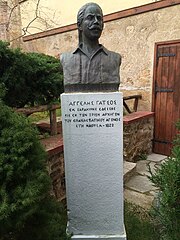

Angelis Gatsos (Greek: Αγγελής Γάτσος; Bulgarian: Ангел Гацов) (1771–1839) was a Slavophone Greek military commander during the Greek War of Independence. He was born in the village of Sarakinovo, today known as Sarakinoi (Almopia municipality, Pella regional unit).
Despite Gatsos' Bulgarian origin, in the first half of the 19th century, the religion was the key factor of identification of the local communities in the Ottoman Empire, while yet united Orthodox fraternity, espoused pro-Greek sentiments. He played an important role during the Greek War of Independence, not only in Macedonia, but also in Central Greece. He joint the klepht bands of Central Macedonia at the age of 20 and played a leading role during the liberation of Naousa from the Ottomans in February 1822. After the city was destroyed by the Ottoman Army, he escaped with Anastasios Karatasos to southern Greece where he took part in many battles of the Revolution. In 1826 he went to Euboea, where he created his own band and participated in the battle of Atalanti Island. After the creation of the independent Greek State, he joined the army and died in Chalkida with the rank of colonel in 1839.
See also
References
- Εθνική Βιβλιοθήκη τής Ελλάδος, τμήμα Χειρογράφων Αρχείον Αγώνος, άρ. 1969. Цитирано по: Тодоров, Николай. „Балкански измерения на гръцкото въстание от 1821 година. Приносът на българите.“, Издателство на Отечествения фронт, 1984, София, стр. 100.
- The hero of the Greek War of Independence from Edessa, Angelis Galsos, is listed unreservedly as a Bulgarian soldier. Unfortunately, I was not able to consult the article by Kiril Mladenov, «Angelos Gatsos, an unknown fighter for the freedom of Macedonia. Information concerning his Bulgarian origins» (in Bulgarian), published in the newspaper Zora, No. 6944, August 1942, which the authors cite in the introduction (p. 30, fn. 73). But I will refer to the documents published in the book concerning Gatsos. On p. 100, there is a letter addressed by the Minister of Interior and acting Minister of War, John Colettis, to Captain Gatsos (Corinth, 4/4/1822): «You did, after all, your duty to our sacred country and took up arms and the Cross to strike the hateful enemies of our religious faith and our independence. Certainly the inhabitants of Olympus should know the kind of ancestors from whom they are descended...» For more see: Despina Loukidou-Mavridou, N. Todorov - V. Trajkov, Btilgari účastníci v borbite za osvoboždenieto na G ărcija, 1821-1828, Sofia, BAN (Institut za balkanistika), 1971, pp. 1017. in Reviews of books, Institute for Balkan Studies, Thessaloniki, 1975; pp. 260-265.
- In Ottoman times the Slavs of Macedonia generally referred to themselves and were known as "Bulgarians". For more see: Koliopoulos, John S.; Veremis, Thanos M. (2010). Modern Greece: A History since 1821. Chichester: Wiley Blackwell, p. 48.
This biographical article related to the military of Greece is a stub. You can help Misplaced Pages by expanding it. |
- 1771 births
- 1839 deaths
- Slavic speakers of Greek Macedonia
- Greek revolutionaries
- Greek military leaders of the Greek War of Independence
- Macedonian revolutionaries (Greek)
- Hellenic Army officers
- Greek colonels
- 19th-century Greek military personnel
- Greek military personnel stubs
- People from Aridaia
- People from the Ottoman Empire